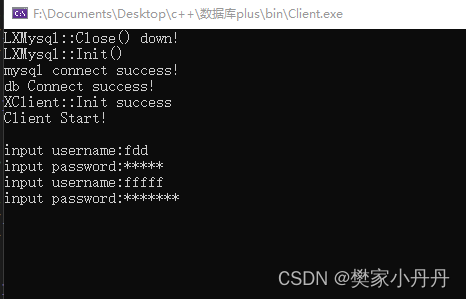在C++编程中,在执行一些操作的时候,终端需要接收用户名和密码,那么在终端输入密码的时候,如何不让别人看见自己的密码,是一个较为关注的问题;
1、问题分析
定义一个登录函数Login
//用户登录主循环bool Login();int MaxLoginTimes=10;bool XClient::Login()
{bool isLogin = false;for (int i = 0;i < MaxLoginTimes;i++){string username = "";//接收用户输入cout << "\ninput username:" << flush;cin >> username;//接收密码输入string password;cout << "input password:" << flush;//做一个成员将密码不被别人看到cin >> password; //在这里密码是可以被别人看见的}return isLogin;
}在这种情况下,输入密码的时候,密码是会被看见的,这样很不安全

2、问题解决:
2.1、Windows环境下: 导入包#include<conio.h>
首先,定义一个专门的输入密码的成员
std::string InputPasswod();直接使用_getch()函数,如果获取输入的字符不显示 ,是因为使用了 getch(),这个内置函数不安全过时了,用_getch()就可以解决问题了
std::string XClient::InputPasswod()
{string password = "";cin.ignore(4096, '\n');for (;;){//获取输入的字符不显示 getch();不安全过时了,用_getch()char a = _getch();if (a <= 0 || a == '\n' || a == '\r')break;cout << "*" << flush;password += a;}return password;
}在Login函数里面调用
bool XClient::Login()
{bool isLogin = false;for (int i = 0;i < MaxLoginTimes;i++){string username = "";//接收用户输入cout << "\ninput username:" << flush;cin >> username;//cout << "["<< username << "]" << endl;//接收密码输入string password;cout << "input password:" << flush;//做一个成员将密码不被别人看到password = InputPasswod();//下面这行代码,可以查看输入的密码cout << "[" << password <<"]" << endl;}return isLogin;
}2.2、那么在Linux下就没有#include<conio.h>也就没有这个_getch()函数的定义了,那么我们可以用#include<termio.h> 使用tcgetattr与tcsetattr函数控制终端
定义:
#ifdef _WIN32
#include<conio.h> //但是linux里面没有
#else
#include<termio.h>
char _getch() //在linux自己定义一个这样的函数
{//new_tm新的显示模式,tm_old旧的显示模式termios new_tm;termios old_tm;//将原来的模式存储下来,放在结构体里面int fd = 0;//tcgetattr获取if (tcgetattr(fd, &old_tm) < 0)return -1;//更改为原始模式,没有回显cfmakeraw(&new_tm);//tcsetattr setif (tcsetattr(fd, TCSANOW, &new_tm)<0){return -1;}char c = getchar();//又改回去 改到旧的模式old_tmif (tcsetattr(fd, TCSANOW, &old_tm) < 0){return -1;}return c;
}
#endif // _WIN322.3、分析一些linux的tcgetattr函数和tcsetattr函数
tcgetattr用于获取终端的相关参数,而tcsetattr函数用于设置终端参数
定义一个termios结构体
termios new_tm;termios old_tm;将文件描述符的属性放入该结构体
tcgetattr(fd, &old_tm)将结构体写回文件描述符,激活配置
tcsetattr(fd, TCSANOW, &new_tm)
tcsetattr(fd, TCSANOW, &old_tm)3、测试
3.1、WIndows测试

3.2、Linux测试

 - 音乐播放(4))




)






Pod介绍、创建Pod、Pod简单资源配额)






